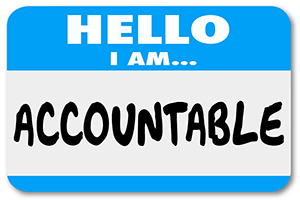Strategies for Building Accountability

In a recent online poll, leaders reported that the number one change they’d like to see in their corporate culture is a stronger commitment to accountability. Accountability takes many different forms across organizations. In many cases, accountability is only referenced in the form of performance failures and mistakes. In this context, accountability is often characterized as being willing to “fall on your sword” and admit your part in where things went wrong. This is a short-sighted and negative interpretation of accountability that is unlikely to create a positive change in an organization’s culture. At its best, accountability is a personal commitment to taking the ownership needed to drive results and achieve goals.
As with any culture change, communicating the new direction, evolving the mindset of employees, and changing systematic processes/procedures takes time. The easiest way to create a culture of accountability is to hire individuals whose personalities are driven to be accountable by nature. Personality in aggregate becomes the culture. However, replacing all existing employees with an army of accountable new hires likely isn’t an option in most organizations.
Coaching accountability is crucial, yet challenging. For accountability to become pervasive, there must be a solid foundation of psychological safety, trust, and a demonstrated history of rewarding accountable behaviors. If the organization has made headlines for terminating employees who made mistakes and struggled to perform, it will be difficult to convince current employees that they’re safe to take ownership of anything.
To start, communicate clearly what accountability should look like in the organization. Give examples of accountable behaviors including pursuing opportunities that align with business goals/objectives, achieving expectations, identifying and solving a problem, admitting mistakes, sharing lessons learned with others, etc.
Next, set regular one-on-one meetings with employees to proactively discuss accountability. This includes setting clear expectations around performance, behaviors, and timelines in order to eliminate surprises. When everyone is on the same page about what success will look like, it’s easier to have an honest reflection-based conversation if results aren’t achieved. You can focus on why goals weren’t met vs debating if the results were enough.
Ensure employees are equally committed to being accountable. No one wants to be accountable alone and feel like others are hiding under the cover of a few who are bold in taking ownership. Help employees overcome any concerns they have over the result of being more accountable. Ask for their feedback on what they need to be successful. Consider designing a system where employees have an accountability partner who serves as an extra resource to ensure everyone is staying on track.
Most importantly, accountability must be modeled by leaders at every level in the organization for a culture change to be successful. When leaders display the behaviors of taking ownership and are vocal about rewarding moments of accountability, the culture will evolve with them. In a culture of accountability, everyone is responsible for holding others accountable. Be open to questions from all levels in the organization and share lessons learned openly. And while accountability shouldn’t focus solely on mistakes, being transparent about them at the highest levels in the organization can be a powerful driving force to create trust, respect, and a commitment to the mission.
Identify your path to CFO success by taking our CFO Readiness Assessmentᵀᴹ.
Become a Member today and get 30% off on-demand courses and tools!
For the most up to date and relevant accounting, finance, treasury and leadership headlines all in one place subscribe to The Balanced Digest.
Follow us on Linkedin!
